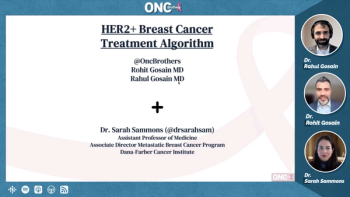
No Benefit in Adding AI to Neoadjuvant Treatment for HR+/HER2+ Breast Cancer
The addition of estrogen deprivation to neoadjuvant chemotherapy did not significantly affect pathologic complete response in women with HR-positive, HER2-positive breast cancer.
The addition of estrogen deprivation to neoadjuvant chemotherapy did not significantly affect pathologic complete response in women with hormone receptor (HR)-positive, HER2-positive breast cancer, according to data from a phase III trial (abstract S3-06) presented at the 2016 San Antonio Breast Cancer Symposium, held December 6–10 in San Antonio, Texas.
According to Mothaffar F. Rimawi, MD, associate professor and medical director at the Lester and Sue Smith Breast Center, the combination increased pathologic complete response numerically, but the improvement was not statistically significant.
Data has shown that estrogen receptor (ER)-positive/HER2-positive tumors are less likely than ER-negative/HER2-positive tumors to respond to dual HER2 inhibition, and the ER pathway may act as a pathway of resistance to anti-HER2 treatment. Although early trials of older chemotherapy regimens combined with tamoxifen suggested antagonistic effects, there are no data available on combinations with more modern treatments.
In the NSABP B52 trial, the researchers hypothesized that concurrent inhibition of ER and HER2 plus chemotherapy would not be antagonistic and would overcome resistance to treatment, improving response rates in patients with ER-positive/HER2-positive breast cancer.
The trial included 308 women who were randomly assigned to standard chemotherapy with docetaxel, carboplatin, trastuzumab, and pertuzumab every 3 weeks (n = 154) or standard chemotherapy plus endocrine therapy with estrogen deprivation (n = 157). Premenopausal women randomized to estrogen deprivation received ovarian function suppression with goserelin or an equivalent plus an aromatase inhibitor. Postmenopausal women received an aromatase inhibitor.
The primary endpoint of the study was pathologic complete response in the breast and nodes. In the overall population, the pathologic complete response rate was 46% for the experimental arm compared with 41% in the control arm (P = .39). A subgroup analysis looking at patients by menopausal status showed no significant difference by treatment for premenopausal (46% vs 44%) or postmenopausal women (45% vs 38%). Pathologic complete response in just the breast was also similar between patients in the experimental arm and those in the control arm (47% vs 44%).
The chemotherapy regimen used had considerable gastrointestinal toxicity, according to Rimawi. The most commonly occurring effects were diarrhea, nausea, vomiting, and dehydration. In addition, febrile neutropenia occurred in 6% of patients in the control arm and 8% of patients in the experimental arm. Rimawi noted that the overall rate of toxicity was quite high, but there was no difference in toxicity between the two study arms.
Based on these results, Rimawi said that they cannot recommend a change to the standard of care neoadjuvant treatment regimen for this patient population. Instead, discovering which patients need more therapy and which need less is an important goal of research.
“Given the toxicity of standard chemotherapy observed on this trial, findings from NSABP B52 argue, quite strongly, for a tailored de-escalation approach where toxic treatments are omitted or replaced with less toxic ones without compromising outcomes,” Rimawi concluded.
Newsletter
Stay up to date on recent advances in the multidisciplinary approach to cancer.


































